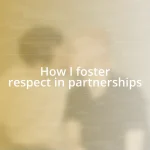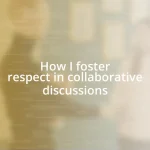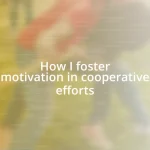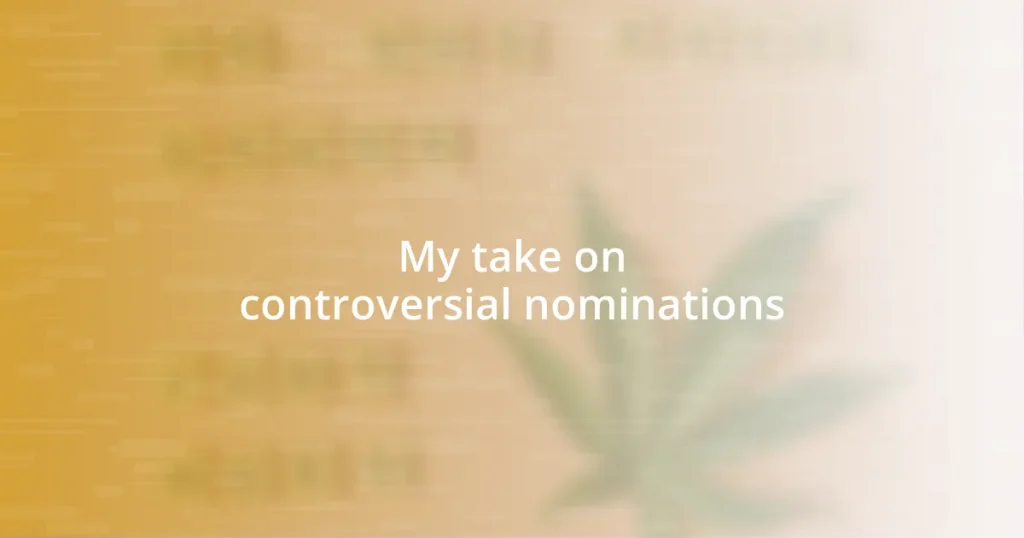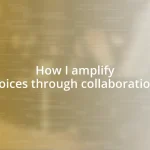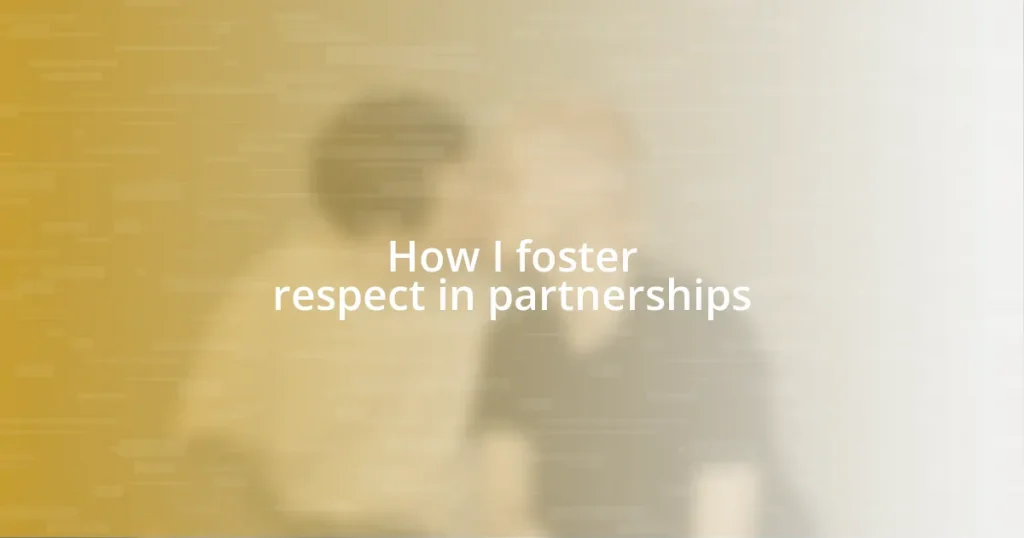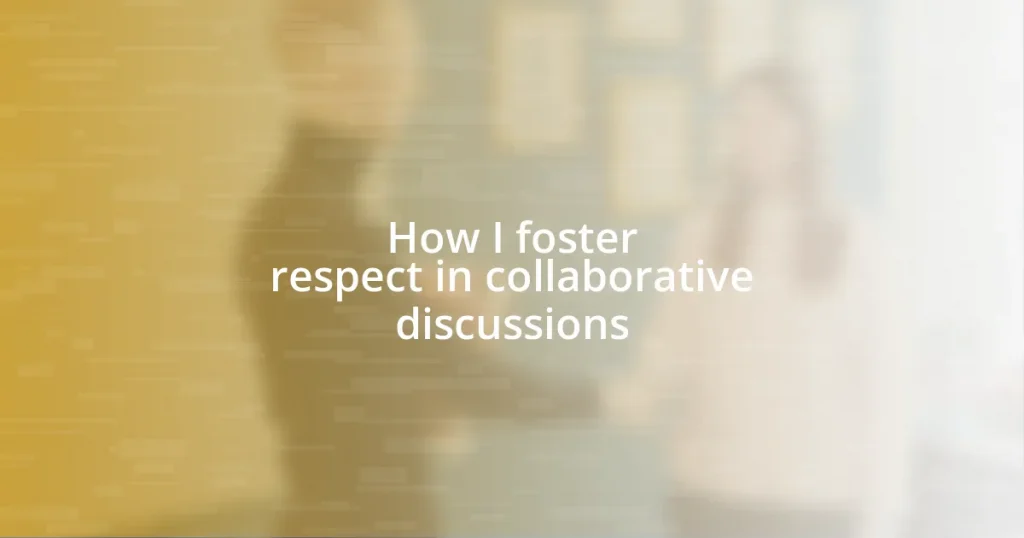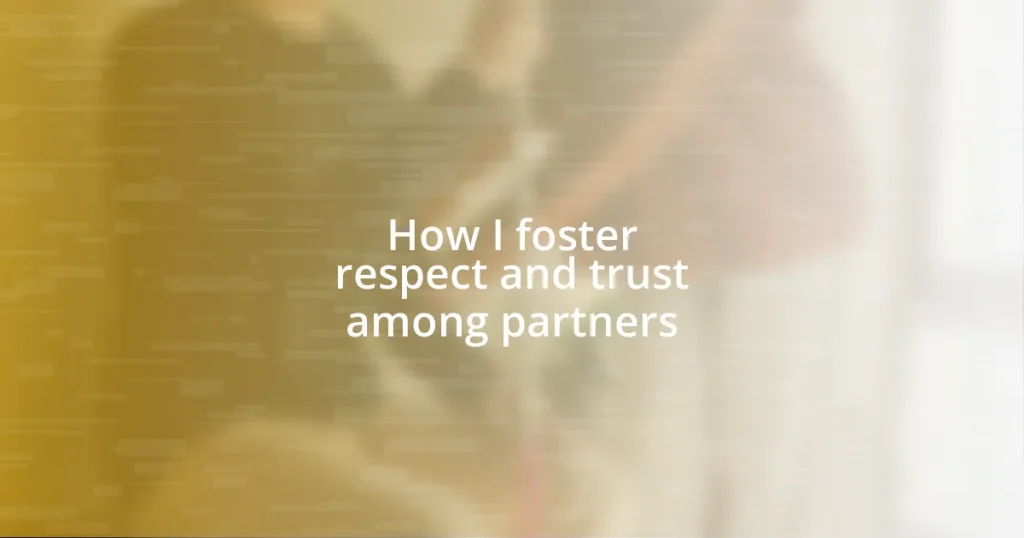Key takeaways:
- Controversial nominations ignite deep emotional debates, reflecting the clash between personal beliefs and societal values.
- These nominations can influence public discourse, revealing biases and catalyzing movements for change or division.
- Public reactions often reveal individual’s values and highlight the complexity of moral integrity versus talent in nominations.
- Strategically navigating controversy encourages constructive dialogue, focusing on potential for change rather than blame.
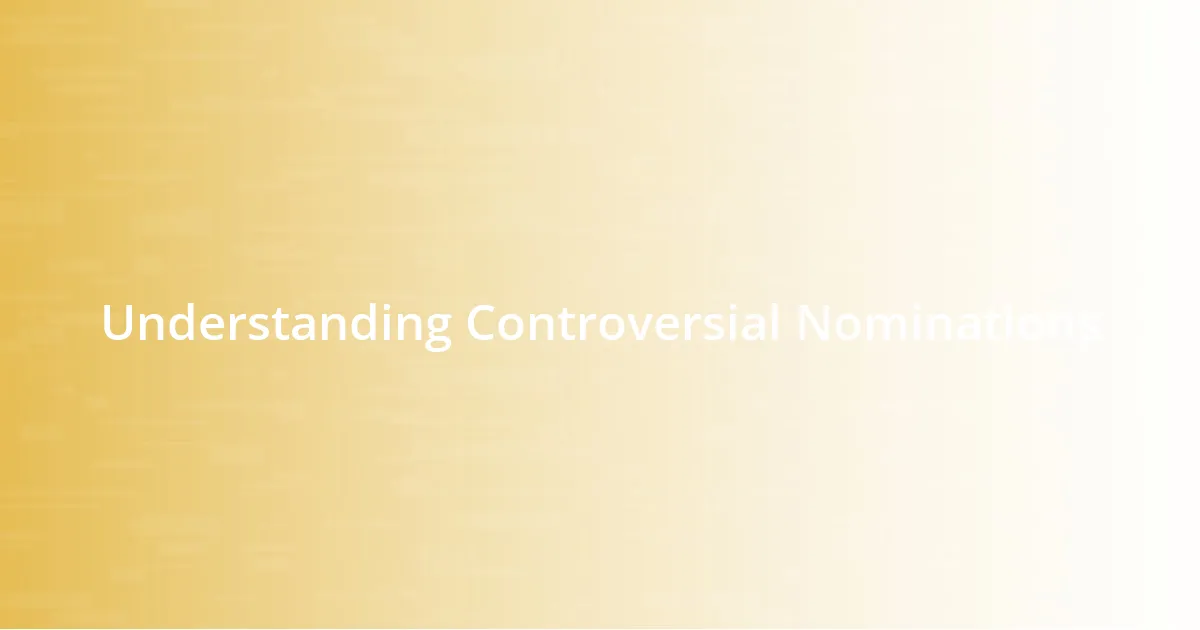
Understanding Controversial Nominations
Controversial nominations often stir up a whirlwind of emotions within communities, and it’s fascinating to see how they reflect societal values. I remember the buzz surrounding a recent nomination—some applauded it, while others felt outraged. Isn’t it intriguing how such a choice can genuinely divide opinions, showcasing both support and dissent?
At the heart of these controversies lies the complex interplay of personal beliefs and cultural influences. When I reflect on nominations that have sparked intense discussions, I can’t help but wonder: what criteria do we use to judge these individuals? For some, it’s talent and merit that matter most, while for others, it’s integrity and past behavior. This divergence in view often turns nominations into battlegrounds of public opinion.
The emotions tied to nominations can run deep. I’ve seen friends passionately defend and criticize nominees, revealing the personal stakes involved. It makes me think: when we engage in these discussions, are we merely arguing our positions, or are we also grappling with our own ideals? Engaging with controversial nominations has a way of pushing us to examine our beliefs, often leading to unforeseen moments of reflection.
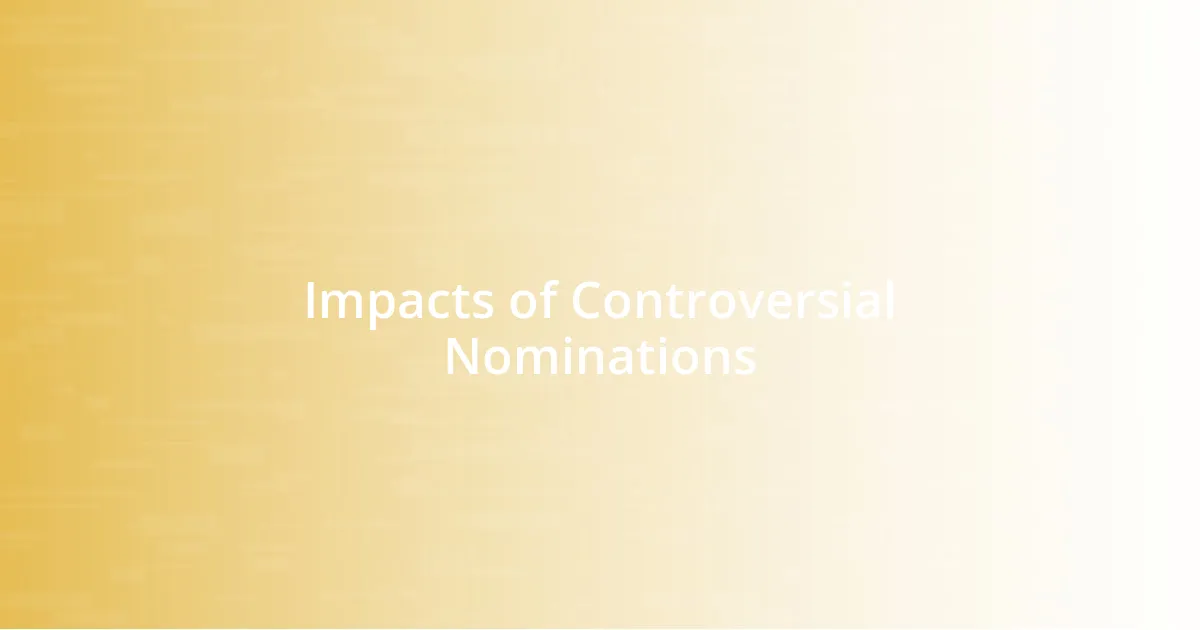
Impacts of Controversial Nominations
Controversial nominations can significantly influence public discourse, shaping perceptions and attitudes toward various societal issues. I’ve often found myself in heated conversations with friends when a polarizing figure is nominated. It’s surprising how such discussions can reveal deeper issues—like biases and values—embedded in our society. These nominations don’t just reflect individual opinions; they can catalyze movements or, conversely, create division.
On a more personal note, I remember the uproar when a notable celebrity was nominated for a prestigious award despite past controversies. Friends of mine rallied behind their favorite nominee, passionately outlining their accomplishments while others argued about the lack of accountability. It reminded me that these moments not only impact those directly involved but also challenge us to confront our moral compass. In moments like these, I can’t help but think about how nominations often become a reflection of the societal changes we wish to see—or sometimes resist.
Moreover, the implications of these nominations can extend beyond immediate reactions. They can set precedents for future nominations, influencing who qualifies as a suitable candidate. When I reflect on the nominations that sparked outrage, I see how they altered the landscape—creating a ripple effect that shifts the expectations and standards within communities. Isn’t it fascinating how each nomination has the potential to ignite a broader conversation?
| Positive Impacts | Negative Impacts |
|---|---|
| Encourages dialogue and debate | Can lead to division within communities |
| Highlights overlooked issues and social injustices | Reinforces existing biases and prejudices |
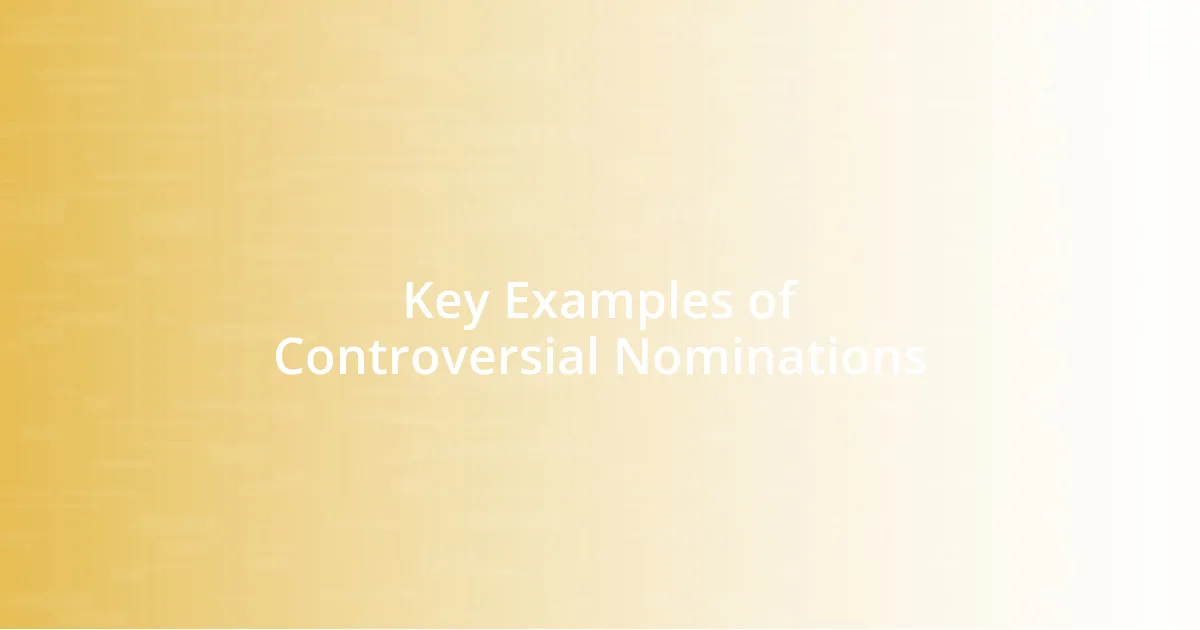
Key Examples of Controversial Nominations
When I think about key examples of controversial nominations, a couple of instances come to mind that genuinely stirred the pot. One nomination that raised eyebrows was that of a well-known filmmaker who faced allegations of misconduct. While some applauded his innovation and creativity, others passionately critiqued his past actions, arguing that accolades shouldn’t go to individuals with questionable ethical behavior. This situation made me realize how often our morals clash with artistic accomplishments.
- In 2021, a musician known for their transformative work received a prestigious award despite being under scrutiny for harmful comments they made in the past.
- A popular politician was nominated for an influential position, causing significant backlash due to allegations of corruption that had not yet been resolved.
- An actor faced intense debate over their nomination for their role in a film that inadvertently touched on sensitive cultural issues, leading to discussions about representation and responsibility.
Reflecting on these examples reminds me of the candid conversations I’ve had with friends committed to social justice. They often express frustration over nominations that seem to celebrate talent while ignoring past behaviors. It strikes me that with every controversial nomination, we’re not just evaluating the nominee but also questioning where we draw the line in our moral landscape. These discussions can be intense yet enlightening, showcasing the diverse values within our community while provoking us to reassess our own beliefs.
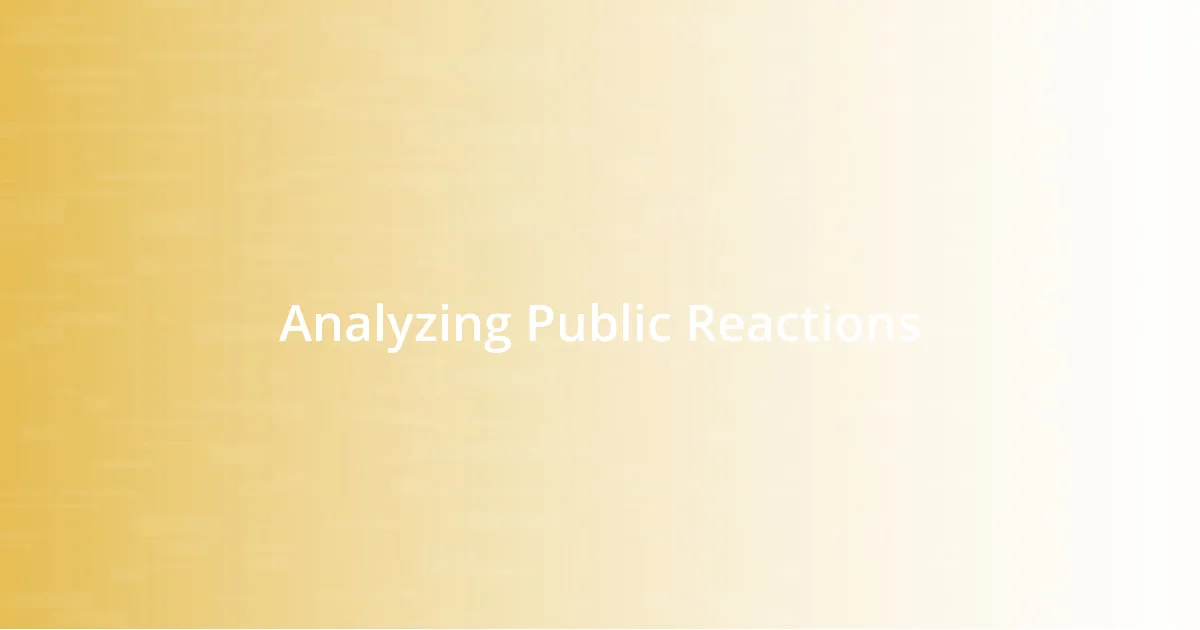
Analyzing Public Reactions
Public reactions to controversial nominations can be explosive. I remember scrolling through social media during the nomination announcement of a prominent figure whose past was riddled with scandals. The posts ranged from fervent defenses of their achievements to sharp rebukes about character flaws. It felt like watching an intense debate unfold in real-time, drawing people with diverse perspectives into the mix. Isn’t it intriguing how these moments spark such passionate dialogue?
What often strikes me is how individuals seem to define themselves by their reactions to these nominations. A friend of mine, who generally stays out of political discussions, took to the comment section to voice her displeasure when a controversial artist received an award. Her anger tapped into something deeper—her passion for accountability in the arts. This made me reflect: How do our reactions reveal our own values and experiences?
While some people rally around a nominee as a way to signal their support for certain ideals, others may see the same figure as emblematic of systemic flaws. For instance, when a beloved actor was nominated despite past allegations, I noticed my colleagues split into factions. Some viewed the nomination as a testament to redemption while others believed it undermined victims’ voices. This division underscores a vital question: Do we prioritize talent over moral integrity? The nuances in these reactions highlight how controversial nominations serve as a mirror to our collective conscience.
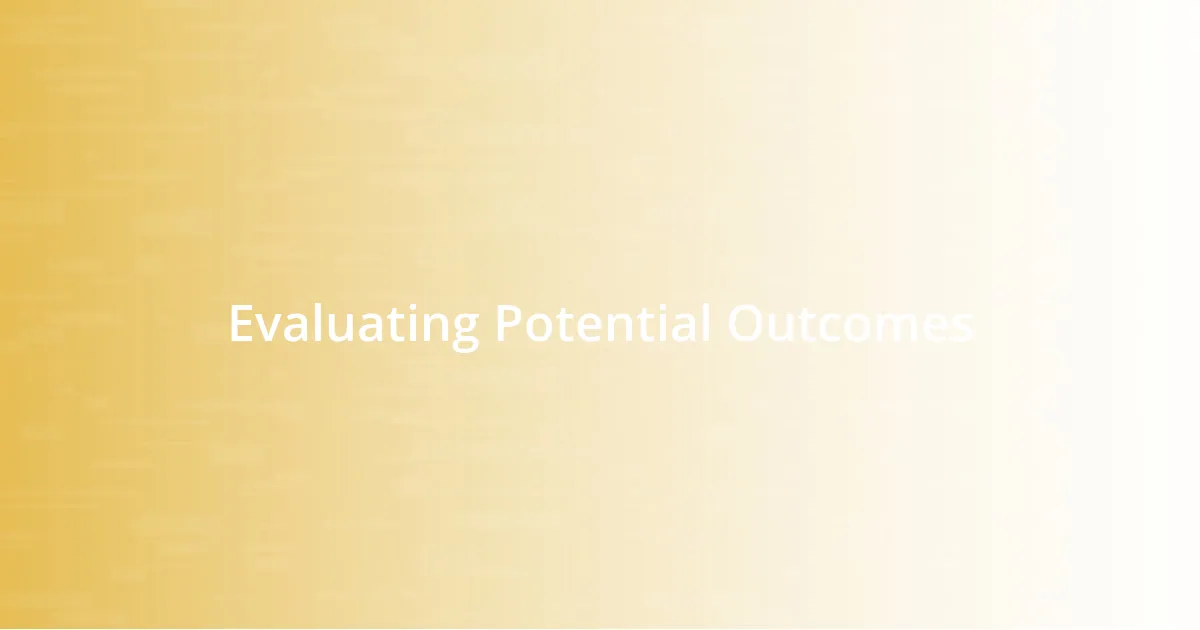
Evaluating Potential Outcomes
Evaluating potential outcomes of controversial nominations requires careful consideration of both immediate and long-term impacts. For instance, when a public figure with a rocky past receives an honor, it can lead to system-wide changes in how organizations approach nominations in the future. I remember witnessing a notable industry backlash after a scandal led to a nominee being stripped of their award; it prompted significant reflection on the vetting processes employed by various institutions. Could this mean a shift toward prioritizing ethical accountability?
Moreover, the societal implications should not be overlooked. These nominations often evoke discussions about cultural values and societal norms, prompting us to reevaluate what we deem acceptable behavior. I recall a time when a revered musician faced backlash after receiving an accolade while their past comments resurfaced. That moment ignited conversations in my circle about accountability in the arts and how our admiration can sometimes overshadow the need for critical discourse. Isn’t it fascinating how these moments can challenge us to reevaluate our beliefs and values?
Ultimately, the outcomes can ripple beyond just the individual involved. Communities often mobilize in response to these nominations, which can lead to broader movements advocating for change. I witnessed this firsthand when a group of my friends organized a campaign after a controversial nomination, aiming to raise awareness about artists’ ethical responsibilities. It made me think: Are these reactions pushing us closer to a more inclusive and just society? The very act of evaluating potential outcomes, therefore, becomes a catalyst for growth and deeper understanding within our communities.
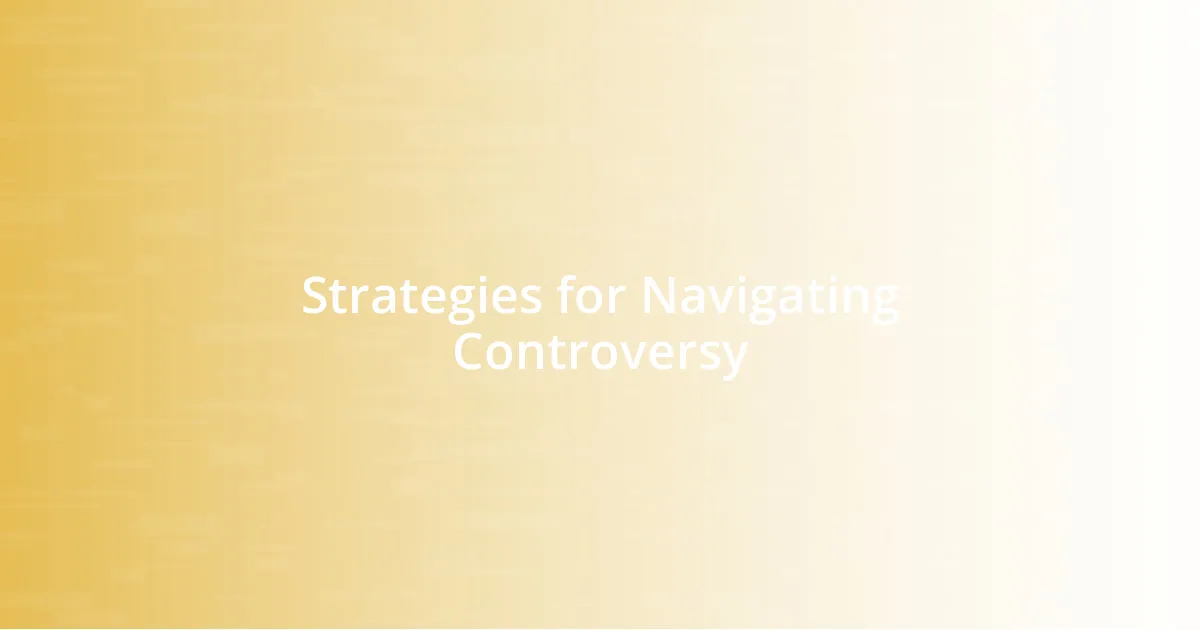
Strategies for Navigating Controversy
Navigating controversy demands a strategic approach that balances passion with pragmatism. I recall a particularly heated discussion about a filmmaker whose past statements triggered outrage. Instead of diving into the debate, I opted to listen first. By absorbing various viewpoints, I found common ground among opposing sides, which allowed me to contribute constructively rather than inflame tensions. It made me realize: How often do we rush to express our opinions without fully understanding the complexity of the situation?
In my experience, framing the narrative can be incredibly powerful. When a friend expressed frustration about a controversial nomination, I suggested we focus on what makes the conversation worthwhile. Shifting the discussion from blame to the potential for change redefined the dialogue, encouraging others to think critically rather than reactively. I learned that asking open-ended questions—like “What can we do to create a better environment in the industry?”—spurred people to engage more deeply and thoughtfully. Isn’t it refreshing to turn a divisive topic into an opportunity for growth?
It’s also crucial to maintain transparency. During a turbulent time in our local art community, I shared my stance candidly on social media, acknowledging the discomfort while also outlining my hopes for future inclusivity. This candidness not only drew in supportive voices but also opened the floor for dissenters to express concerns respectfully. I found that this practice cultivates trust, reminding us that navigating controversy isn’t just about winning an argument—it’s about fostering understanding and collaboration. Have you ever considered how openness can transform disagreements into meaningful conversations?
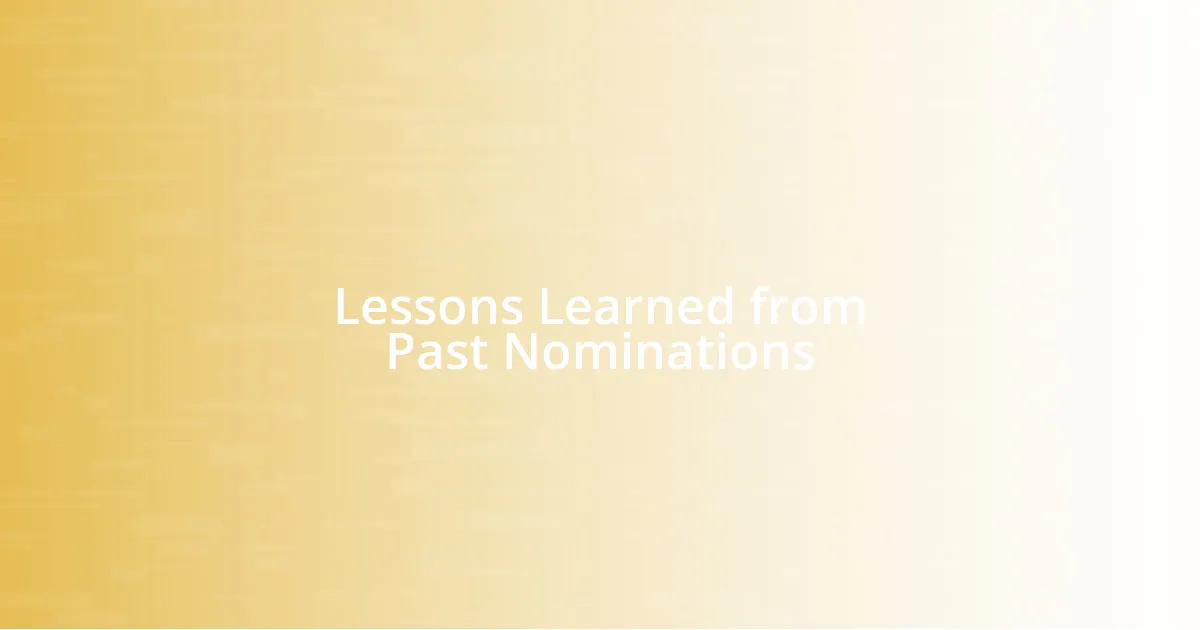
Lessons Learned from Past Nominations
Reflecting on past nominations has taught me that context matters just as much as the individual being nominated. I remember a debate around an award given to a director whose past actions raised eyebrows. Instead of solely judging the person, my friends and I began discussing what those actions reveal about the industry’s values. It struck me how often we overlook the broader context and how it shapes the narratives surrounding these nominations. Shouldn’t we consider both the individual and the larger picture?
One lesson that stands out is the significance of public sentiment. I can recall a scenario where a beloved actor faced scrutiny after being nominated for an award despite troubling allegations. This controversy didn’t just lead to a discussion about their character; it sparked a larger movement about accountability in Hollywood. It made me think—how do our collective voices shape the landscape of recognition in the arts? We must acknowledge that public opinion often serves as a powerful indicator of societal change.
Interestingly, I’ve found that these moments can push institutions to adapt more rigorously. I recall a situation where a prominent organization faced backlash after honoring a nominee controversial for their political views. This response led the organization to re-evaluate their nomination criteria. Instead of simply taking a reactive stance, they actively sought out diverse perspectives to inform their decisions moving forward. It made me wonder—can we turn each moment of controversy into a structured opportunity for reflection and transformation?
